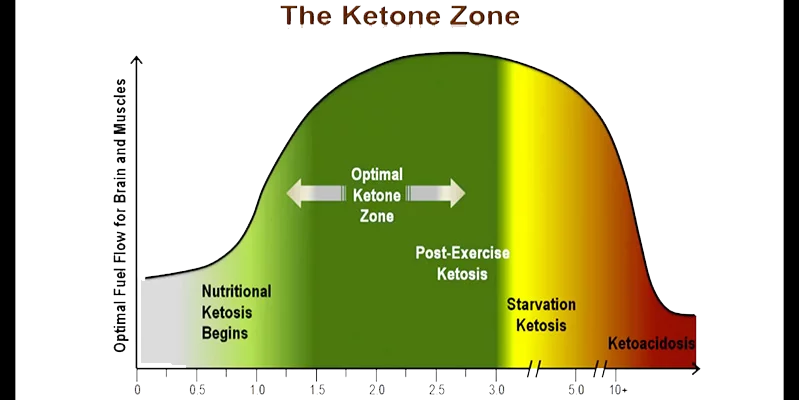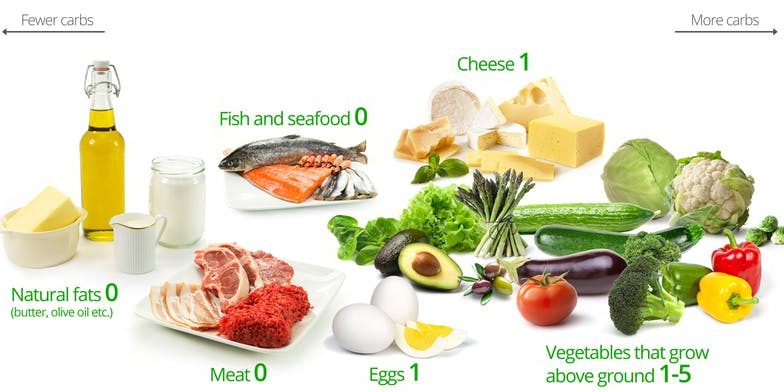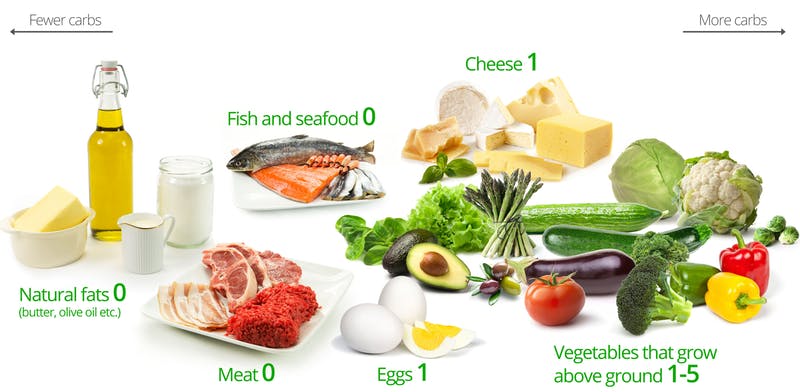A beginners guide to going Keto…
Here you’ll learn how to eat a keto diet based on real foods that you enjoy eating. You’ll find visual recipes, meal plans, helpful visual guides and a simple 2-week quick start program, all you need to succeed on the keto diet.
What does keto even mean?
The “keto” in a ketogenic diet comes from the fact that it makes the body produce small fuel molecules called “ketones”. This is an alternative fuel for the body, used when blood sugar (glucose) is in short supply.
Ketones are produced if you eat very few carbs (that are quickly broken down into blood sugar) and only moderate amounts of protein (excess protein can also be converted to blood sugar).
Ketones are produced in the liver, from fat. They are then used as fuel throughout the body, including the brain. The brain is a hungry organ that consumes lots of energy every day, and it can’t run on fat directly. It can only run on glucose… or ketones.
On a ketogenic diet, your entire body switches its fuel supply to run almost entirely on fat. Insulin levels become very low, and fat burning increases dramatically. This makes it much easier to burn off your excess stored fat. This is great if you’re trying to lose weight, but there are also other less obvious benefits, such as less hunger and a steady supply of energy, keeping you alert and focused.
When the body produces ketones, it’s said to be in ketosis. The fastest way to get there is by fasting – not eating anything – but nobody can fast forever.
You can, on the other hand, follow a keto diet indefinitely which also results in ketosis. It has many of the benefits of fasting – including weight loss – without having to fast.

Can Everyone follow a keto diet?
Almost anyone can safely eat a keto diet however their are some special considerations. If you are a nursing mother you would not want to follow a strict low calorie diet because of the loss of sugar, up to 30 grams a day, via milk. This could lead to a dangerous condition called ketoacidoses. It would be more appropriate for a moderately low carb diet of around 50 grams per day.
Also, if you are a diabetic, while a keto diet may be one of the best things you can do for yourself, there may be some considerations for insulin requirements. Once you are eating a very low carb diet, you will avoid the spikes in blood sugar that require insulin, so you may almost instantly require less. Less carbs should equal less medicine. It is a very good idea to consult with your doctor before starting a keto diet if you are a diabetic. The two of you can form a plan for extra blood testing and monitoring while you determine the effects on your medication needs. Often, type 2 diabetics are able to stop taking medication all together after a short while.
People who suffer with low blood pressure should also consult their doctor before starting to follow a keto diet. While a keto eating plan wwill certainly have positive benefits on your blood pressure, you might get too well for your meds. The blood pressure lowering effect of an ultra low carb diet can happen with days or weeks and your medications might cause your blood pressure to become too low.
Just to recap. A low carb diet is good for almost everyone but their are precaution that need to be taken by the following people
- Breastfeeding Mothers
- People taking High Blood Pressure Meds
- Diabetics
What can I eat on a keto diet?
Following a very low carb diet and still finding things you like to eat really is not that difficult for most people. That’s not to say you won’t have to give up some things you like. You probably will, but for now let’s focus on the things you can have. You should be getting the bulk of your calories from things like fish, eggs, meats, vegetables and natural fats like olive oil and butter. You should try to follow the general rule of thumb of eating foods that are less than 5% carbs.

Unprocessed meats are both low carb and keto-friendly, with organic and grass-fed meat being the most healthy. It is important to remember though that keto is a high-fat diet, not high protein, so you don’t need huge amounts of meat. Eating more than your body needs) is converted to glucose, making it harder to get into ketosis. A normal amount of meat is enough. Also, fish and seafood are good, excellent even, for a keto diet. Especially fatty fish like salmon. Try to buy wild caught whenever possible and avoid breading, as it contains carbs.
Organic eggs are a terrific food for someone eating a keto diet. They are low carb and full of important vitamins and minerals. They are super versatile and can be prepared in some way for whatever meal of the day you choose. Some favorites at my house include poached, deviled, fried, and baked. They are a very keto friendly food.Fats should account for the largest portion of calories when you are eating a keto diet. Not just any fats though. The fats for a keto diet should come from olive oil, butter, coconut oils, avocado, and creme.
What do I need to stop eating on a keto diet?
Sugar is the first big no-no. Cut out all soft drinks, fruit juice, sport drinks and “vitamin water” (these are all basically sugar water). Avoid sweets, candy, cakes, cookies, chocolate bars, donuts, frozen treats and breakfast cereals. It is also important to read labels for hidden sugars, especially in sauces, condiments, drinks, dressings and packaged goods. Honey, maple syrup, and agave are also sugars. Ideally try to avoid or limit artificial sweeteners as well.
Starches are the other big no-no. Bread, pasta, rice, potatoes (including sweet potatoes), French fries, potato chips, porridge, muesli and so on. Wholegrain products are also bad, just less bad. Legumes, such as beans and lentils, are high in carbs too. Small amounts of certain root vegetables (other than potatoes and sweet potatoes) may be OK.
Beer and Hard Ciders, as well as red wine and spiced rums are off limits. Beer is basically just liquid bread. They are both full of rapidly absorbed carbs
Fruits are mostly off limits. Fruits are very high in sugar therefore very high in carbs. Fruit should be eaten sparingly. Treat it as you would candy.
